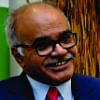
Selim Jahan
Selim Jahan is former director of the Human Development Report Office under the United Nations Development Programme and lead author of the Human Development Report.
Selim Jahan is former director of the Human Development Report Office under the United Nations Development Programme and lead author of the Human Development Report.
On the first day of the Bangla New Year, every nook and corner of Bangladesh is brightened.
The million-dollar question is: how can Bangladesh recover the laundered money that has crossed its borders?
There is no denying the fact that the greatest wealth of a nation is neither its geographical size nor its natural resources, but its skilled human resources.
Assessing the overall results of the index, it seems that the world’s democracies are struggling.
In the new geopolitical order, Bangladesh must seize the emerging economic opportunities.
Today, Bangladesh aspires to build a society without inequalities—particularly economic inequalities.
The efficacy of various policy measures undertaken by the government has been questioned.
Every child born in Bangladesh today is born with a debt.
The “digital divide” is a way to describe the inequality in the online community.
Over the years, one of the social protection instruments that has been piloted in many countries is the universal basic income.
November 25 highlights the global issue of violence against women and its impact.
The October 30 budget was presented against the backdrop of certain predictions.
Bangladesh’s economic growth slowed down due to global uncertainties and domestic political instability and natural disasters.
Financial contributions to the UN by big and powerful developing countries like China, India, Brazil, South Africa, Nigeria and the oil-rich countries of the Middle East must increase so that the developing world has a solid voice.
Sri Lanka has recently elected Anura Kumara Dissanayaka as its new president.
Issues of fundamental human rights violations, the destruction of social justice, and unjust biases remain central to inequalities and discrimination.
What needs to be done in today’s Bangladesh, as the country is trying to move forward?
Inequalities occur not only in income, but also in non-income dimensions